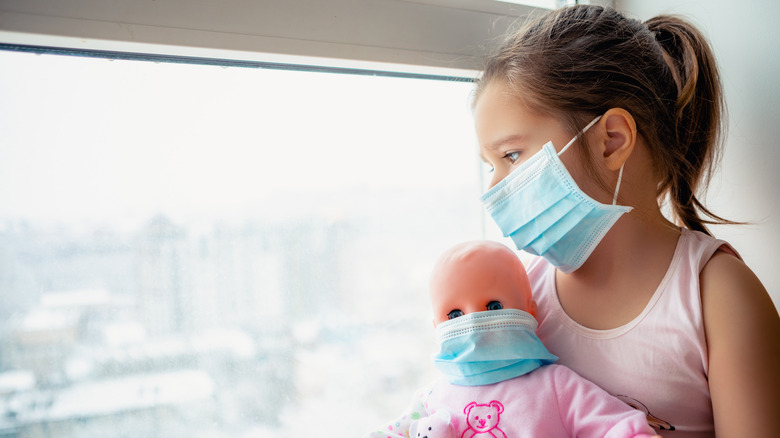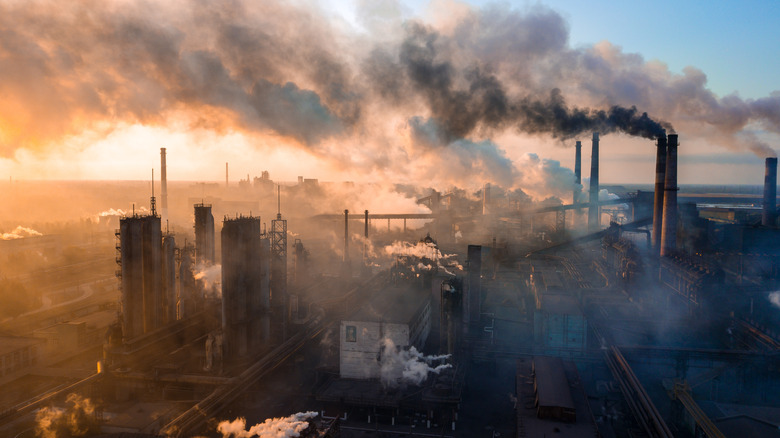Is There A Link Between Autism And Air Pollution?
A growing body of research is examining how air pollution affects our health, and some of that research has determined potential links between autism and air pollution, reports Healthline. While more research is needed for firm conclusions to be drawn, knowing how to protect yourself and your children from the dangers of air pollution is paramount in creating barriers against toxins in the air.
According to the National Institute of Mental Health, autism spectrum disorder (ASD) is classified in the Diagnostic and Statistical Manual of Mental Disorders (DSM-5) as both a developmental and a neurological condition that alters the interactions, learning, behavior, and communication of a person. Since it is a spectrum disorder, people who are diagnosed with ASD will experience the disorder to varying degrees. Being defined as a developmental disorder, the emphasis of ASD is on identifying characteristics of the disorder in children, particularly in documenting symptoms shown by children within the first few years of life. However, ASD can be diagnosed at any age, including adulthood. People with ASD usually express repetitive behaviors, experience difficulty communicating with others and perceiving social gestures, endure learning impairments, and have restricted, intense interests in specific subject matter. The cause of autism is unknown, though experts have ideas of contributing factors that may lead to ASD, per Healthline. Speculations include inherited genes and genetic mutations, metabolic imbalances, low birth weight, and maternal and fetal exposure to environmental toxins, including air pollution. Here's how air pollution may contribute to autism.
Air pollution may contribute to Autism
Again, the scientific findings are fairly new and additional research is required to confirm the conclusions, but at least two studies have found correlations between air pollution and the development of autism (via Healthline). Researchers of a 2018 study published in Environmental Epidemiology spent 24 years examining over 15,000 infants in Denmark and discovered that babies exposed to higher amounts of air pollution during the months directly succeeding birth were more likely to develop autism spectrum disorder (ASD). The same results were determined for the same group of infants as they aged if they continued to be exposed to air pollution, even if the levels of air pollution were considered to be low. The conclusion was that even small amounts of air pollution pose a risk to health.
A 2019 study published in JAMA Pediatrics observed approximately 132,000 newborns in Vancouver, Canada over a period of six years. The study's researchers looked specifically at maternal and fetal exposure during pregnancy to nitric oxide from air pollution created by vehicle exhaust. The findings of the study determined a link between toxic exposure and increased diagnostic rates of ASD during childhood for the babies whose mothers were subjected to car exhaust and nitric oxide while pregnant. Once again, even low levels of exposure to air pollution were found to increase the risk of a child being diagnosed with autism. If you're concerned about your child's health and development, always consult your child's pediatrician.
Staying protected from air pollution
Knowledge is power when it comes to protecting both yourself and others from harmful air pollution exposure. Recommendations for expectant mothers include avoiding smoke, both from cigarettes and other sources, and making an effort to stay away from areas with low air quality, per UT Southwestern Medical Center. For everyone, it can be extremely beneficial to create a habit of monitoring the air quality index (AQI) and knowing what to do when the air quality is poor. A suggested way to keep track of local air quality is to utilize the AQI search tool available on the website airnow.gov. Wearing a mask can protect your respiratory system from inhaling toxins, though you should be aware that pollutants can enter your body through your skin. When your local area experiences high levels of air pollution, avoid outside workouts and limit your exposure to outdoor pollutants. Investing in air purifiers for indoor spaces can filter pollutants and toxins from the surrounding air.
When it comes to minimizing contributions to air pollution, the United States Environmental Protection Agency (EPA) recommends conserving energy everywhere you go by maintaining vehicles, including boats, and ensuring that all tires are appropriately inflated so there isn't unnecessary exertion of vehicular energy and exhaust. Alternative transportation methods such as carpooling, walking, biking, and public transportation are suggested for decreasing contributions to air pollutants. Incorporating composting is another habit that can reduce contributions to air pollution, as can replacing wood burning with gas logs.



